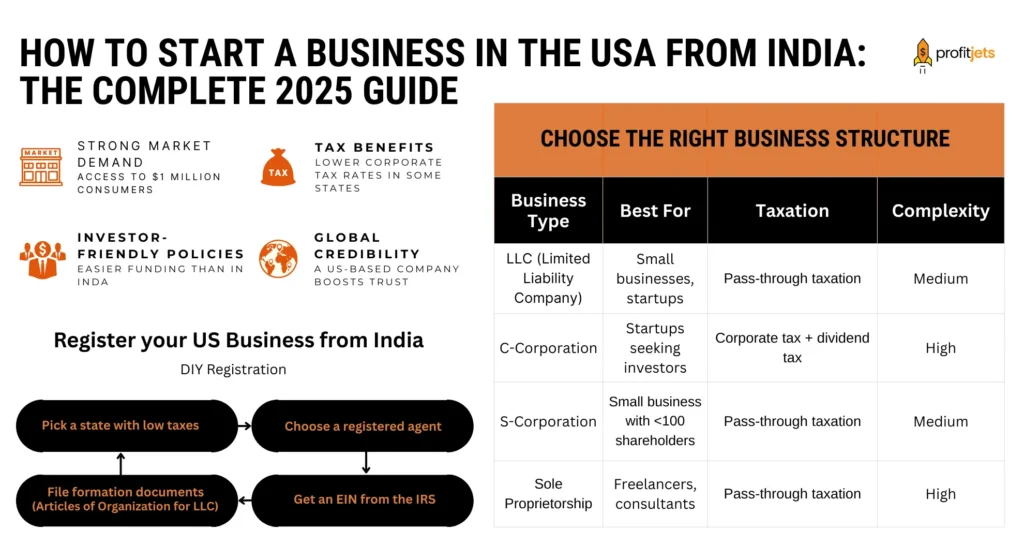The USA is one of the most attractive destinations for Indian entrepreneurs looking to expand globally. With access to over 331 million consumers, the market offers opportunities for exponential growth.
It is a popular destination due to its investor-friendly policies, which make it easier to raise funding compared to India, especially for startups seeking venture capital or angel investors.

Perhaps most importantly, having a U.S.-registered company enhances global credibility, helping Indian founders build trust with international clients, partners, and investors.
This article outlines how to register a company in the USA from India, covering both legal setup and accounting.
Table of Contents
Step 1: Choose the Right Business Structure
Selecting the right structure—LLC, Corporation (C-Corp or S-Corp), or Sole Proprietorship—will define how you pay taxes, raise capital, and protect your assets. For Indian founders, an LLC is often the most flexible option because it offers limited liability, simple compliance, and pass-through taxation. If you’re targeting venture capital funding, however, a Delaware C-Corp is typically preferred.
Here’s a snapshot of some of your options:
| Business Type | Best For | Taxation | Complexity |
| LLC (Limited Liability Company) | Small businesses, startups | Pass-through taxation | Medium |
| C-Corporation | Startups seeking investors | Corporate tax + dividend tax | High |
| S-Corporation | Small business with <100 shareholders | Pass-through taxation | Medium |
| Sole Proprietorship | Freelancers, consultants | Personal tax filing | Low |
According to the U.S. Small Business Administration (SBA), over 70% of foreign entrepreneurs choose LLCs when registering a U.S. business because of their flexibility and investor-friendly legal system.
Step 2: U.S. Company Registration from India
You don’t need to travel to the U.S.—registration can be completed entirely online with a registered agent. Ensure that your chosen name complies with USPTO trademark checks to avoid legal hurdles later.
Most Indian entrepreneurs choose states like Delaware, Wyoming, or Texas for ease of incorporation and tax benefits. Delaware is known for its business-friendly courts and low corporate tax rates, making it the go-to state for startups. In 2024, Delaware had approximately 2 million active domestic business entities registered, affirming its status as the premier jurisdiction for company formations. The state’s modern, flexible corporate statutes, business-friendly courts, and predictable legal framework contribute to its attractiveness.
Options and Steps for U.S. Company Registration from India
Option 1: DIY Registration
You can file for registration by yourself through state websites (Delaware, Wyoming, and Florida are popular examples). Although the process is complicated, the steps can be broadly classified as represented below:
- Choose a state with low taxes and suitable regulations.
- Hire a registered agent- mandatory for compliance.
- File formation documents as per the state law (e.g., Articles of Organization for LLC).
- Apply for an EIN (Employer Identification Number) from the IRS.
Option 2: Use a Business Registration Service
Several US-based accounting firms in India help with:
- Name availability checks
- Registered agent services
- EIN & tax ID setup &
- Compliance filings
Hiring an outsourced bookkeeping service can also help you handle registrations.

Step 3: Open a US Business Bank Account
Opening a U.S. business bank account is critical for building credit history, accepting international payments, and complying with U.S. tax rules.
Banks like Mercury, Brex, and Relay allow non-resident founders to open accounts with just incorporation documents, EIN (Employer Identification Number), and proof of identity.
How to Open an Account Remotely
In 2025, many fintech banks let you apply remotely with video KYC, online document submission, and virtual mailing addresses. Mercury, for example, provides U.S. checking accounts for founders abroad without requiring a Social Security Number. However, traditional banks like Bank of America or Chase may still require physical presence.
A Fintech Report states that there is a substantial shift among foreign entrepreneurs toward digital-first banks. This move is primarily driven by the desire for faster onboarding, lower fees, and more user-friendly digital experiences.
Here are some preferred banks:
- Mercury, Wise, or Relay (FinTech-friendly)
- Traditional banks (Bank of America, Chase) – Some require a US visit
- Through a US-based accounting firm (They can assist remotely)
Step 4: Set Up Accounting & Bookkeeping
Begin by using cloud-based accounting software, such as QuickBooks Online, Xero, or Zoho Books. U.S. tax laws are strict, and poor bookkeeping can lead to penalties, IRS audits, or double taxation risks. Hiring an outsourced U.S.-based bookkeeping service is cost-effective compared to maintaining a full-time accountant in-house, and Profitjets is a preferred Outsourced bookkeeper.
Here are the popular Bookkeeping Software for US Businesses
| Software | Best For | Pricing |
| QuickBooks Online | Small Business | 30 – 200/Month |
| Xero | Startups & E-commerce | 12 – 65/Month |
| FreshBooks | Freelancers and Consultants | 17 – 55/Month |
Step 5: Manage Small Business Invoices
You could use automated invoicing tools like FreshBooks or QuickBooks to send professional, IRS-compliant invoices. If you plan on hiring tax services, they can automate invoice tracking for deductions.
Ensure invoices mention EIN, payment terms, and accepted currencies (USD/INR). For Indian founders billing U.S. clients, integrating Stripe or PayPal allows seamless cross-border transactions with real-time exchange rates.
Offer Net 30 or Net 15 terms to U.S. clients to remain competitive, but use automated reminders to prevent delayed payments.
Elements of your US invoice include:
- Business name & address
- Invoice number & date
- Client details
- Description of services
- Payment terms (Net 30, Net 15)
Here’s our recommendation for the Best Tools for Invoicing
- QuickBooks (Auto tax calculations)
- Zoho Invoice (Free for small businesses)
- Wave (Free invoicing + payments)
Step 6: Understand US Tax Obligations
Ensure you file for an EIN from the IRS before starting operations.
As a non-resident business owner, you’ll typically pay federal income tax, state taxes (if applicable), and sales tax depending on your business model.
If you form an LLC, income passes through to members, and you report profits on your Form 1040NR. A C-Corp, however, will be subject to a 21% federal corporate tax rate (as of 2025).
Key Taxes for Foreign-Owned US Businesses
| Tax Type | Who Pays? | Filing Deadline |
| Federal Income Tax | All businesses | April 15th |
| State Tax | Depends on the state | Varies |
| Sales Tax | If selling products | Quarterly |
| Payroll Tax | If hiring employees | Monthly/Quarterly |
How to Avoid Double Taxation (USA + India)
India and the U.S. have a Double Tax Avoidance Agreement (DTAA), which ensures you don’t pay taxes twice on the same income. To claim benefits, maintain clear documentation of your tax filings in both countries. For example, if your U.S. business pays 21% corporate tax, you can offset this against Indian tax liability under DTAA rules.
Consult an international tax expert or a US-based accounting firm in India to structure your business for maximum tax efficiency. The key is to use the India-U.S. tax treaty, claim available foreign tax credits, and consider hiring a virtual CFO or international tax experts who can structure your business for maximum efficiency. This way, you stay compliant in both countries while reducing your overall tax burden.
You could also read our blog: Mistakes to Avoid When Registering a Company in the USA from India

Final Thoughts
To register a company in the USA from India is no doubt a difficult task, but with planning, help from consultants and agents, and the right strategy to approach it, you can set up a business within months.
Hiring Profitjets could make a significant difference for Indian founders setting up a business in the U.S. A seasoned virtual CFO brings deep expertise in cross-border compliance, U.S. GAAP, federal and state tax regulations, and entity structuring, helping you navigate the complexities that often trip up first-time founders.
FAQs: How to Start a Business in the USA from India
1. Can an Indian Citizen Own a US Company?
Yes, an Indian citizen can own a U.S. company without needing U.S. citizenship or residency. Indian entrepreneurs commonly register as LLCs (Limited Liability Companies) or C-Corporations, which allow 100% foreign ownership. To start a business in the USA from India, you’ll need to appoint a registered agent, get an EIN (Employer Identification Number), and comply with U.S. state filing requirements. Many Indian founders choose Delaware or Wyoming due to their business-friendly laws and tax benefits.
2. Which US State is Best for Indian Entrepreneurs?
The best U.S. state for Indian entrepreneurs depends on your business goals. Delaware is the most popular choice, especially for startups seeking venture capital, because over 66% of Fortune 500 companies are incorporated there. Wyoming is attractive for small businesses due to its no state income tax and low filing fees. Meanwhile, Texas offers a large market, favorable regulations, and no corporate income tax. Choosing the right state can reduce costs, simplify compliance, and improve access to investors.
– Delaware – Best for startups (low fees, strong laws)
– Wyoming – No corporate tax
– Texas – No state income tax
3. Do I Need a US Address to Register a Business?
No, Indian citizens do not need a physical U.S. address to register a business. Instead, you must appoint a registered agent in the state of incorporation, who will receive legal and tax documents on your behalf. Many service providers offer virtual office addresses or mail forwarding services that satisfy this requirement. This means you can start a business in the USA from India without ever traveling to the U.S.
4. How Much Does It Cost to Start a Business in the USA from India?
The cost to start a business in the USA from India varies by state and entity type. On average, LLC formation fees range between $150–$800, while incorporating a C-Corp may cost slightly more. In addition, you may need to budget for registered agent fees ($100–$300/year), EIN application (free directly via IRS), and business bank account setup. If you opt for professional incorporation services, the cost may range from $500–$1,500 in total.
– LLC Registration: 500 − 1,500
– C-Corp Setup: 1,000 − 2,500
– Annual Compliance: 500 − 2,000
5. How can Indian entrepreneurs open a US business bank account remotely?
In 2025, several fintech platforms such as Mercury, Brex, and Relay will allow Indian entrepreneurs to open a U.S. business bank account remotely. You’ll need incorporation documents, an EIN, and a valid ID. Traditional banks like Chase or Bank of America may require you to visit the U.S., but fintech solutions are designed for international founders and offer fast, low-cost onboarding.
6. How do I avoid double taxation in the USA and India?
To avoid double taxation, Indian business owners can take advantage of the India–U.S. Double Tax Avoidance Agreement (DTAA). This treaty ensures that income taxed in the U.S. can be offset against Indian tax liability. For example, if your U.S. business pays 21% corporate tax, you can claim it as a foreign tax credit in India. To maximize tax efficiency, keep detailed records, file taxes in both countries, and consider hiring international tax experts or CFO services.
7. Why should Indian entrepreneurs hire professional bookkeeping services in the USA?
Hiring professional bookkeeping services in the U.S. ensures compliance with IRS regulations, GAAP standards, and investor requirements. Outsourced bookkeeping helps Indian founders manage cash flow, issue compliant invoices, and prepare audit-ready financials. According to Deloitte, 64% of small businesses using outsourced bookkeeping reported higher profitability. For Indian entrepreneurs targeting U.S. clients or investors, professional bookkeeping adds credibility and financial transparency.










